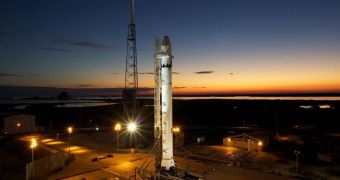The Space Exploration Technologies Corporation (SpaceX) is making considerable headway in its efforts to launch its first medium-lift rocket later this year. The Falcon 9 prototype, which rests on Launch Complex 40 at the Cape Canaveral Air Force Base (CCAFS), in Florida, was brought to life for the first time on Friday. Experts loaded more than 75,000 gallons of propellant on the spacecraft, and SpaceX engineers then had a chance to assess the functionality of all systems onboard. According to preliminary results, it would appear that everything is set to go, Space reports.
According to the Falcon 9 launch director, Tim Buzza, the recent wet dress rehearsal can be qualified as the smoothest test the private company has developed thus far. The engineers filled all of the tanks with liquid oxygen, causing the white rocket to become coated in ice. Fuel levels were brought to take-off levels, and then the kerosene fuel was added. This propellant powers the nine Merlin engines that power up both the first and second stage of the Falcon 9. The countdown began from the T-minus 2 hour and 30 minute mark.
During the maneuvers, experts watched from the SpaceX Launch Control Center as all systems came to life, and performed within expectations. In addition, the control team also carried out a series of tests, including engine purge checks. All workers were moved away from the pad, just as they would during an actual launch countdown sequence. The navigation systems on the rocket was also switched on, and at one point, at T-minus 10 minutes, the experts switched the rocket to its internal power supply. Telemetry on the steering systems and the fuel tanks also showed that these components were functioning within optimal parameters.
After scientists at SpaceX finish analyzing the data collected during the Friday tests, the company plans to conduct another test, which will see the engines on the Falcon 9's first stage roar to life for about 3-4 seconds. Although the rocket and its crew are obviously making progress, a launch date has yet to be fixed. Analysts say that the rocket will not launch before March 22, and add that the flight test has a launch window opened every day, starting at about 11 am EDT. The results of the first Falcon 9 flight will be instrumental in ensuring that the company can respect the $1.6 billion contract it has with NASA, for delivering cargo, and eventually astronauts, to the International Space Station (ISS).

 14 DAY TRIAL //
14 DAY TRIAL //